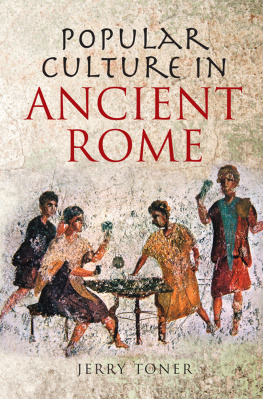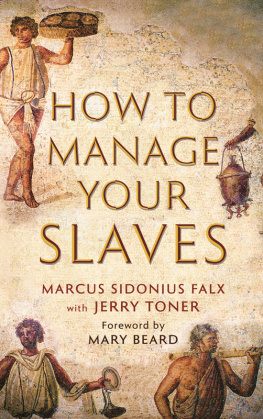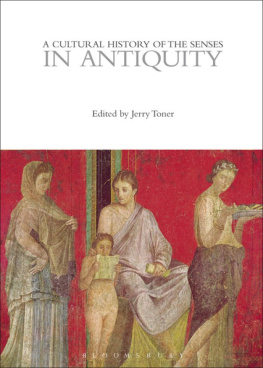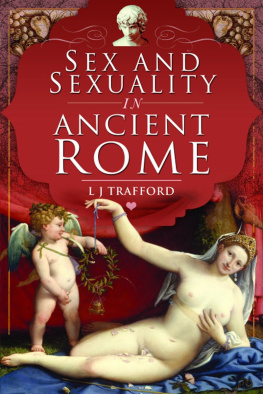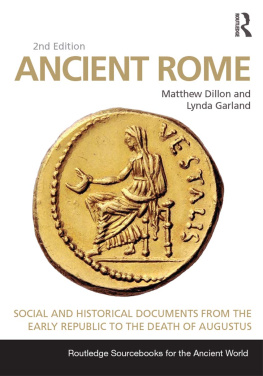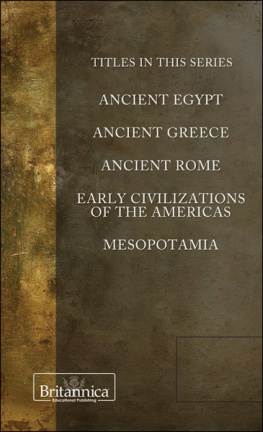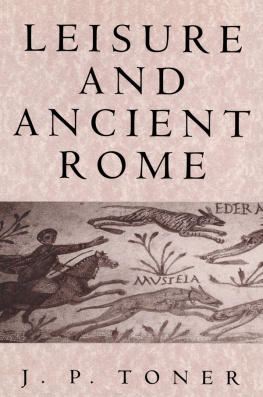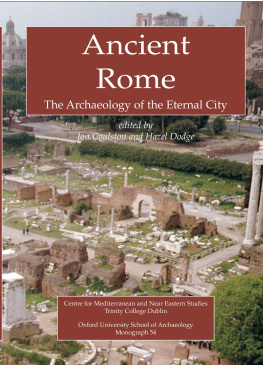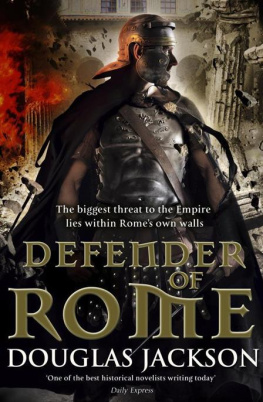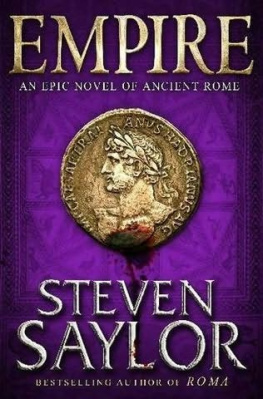INFAMY
ALSO BY JERRY TONER
How to Manage Your Slaves
Release Your Inner Roman
The Ancient World
INFAMY
THE CRIMES OF ANCIENT ROME
JERRY TONER

First published in Great Britain in 2019 by
PROFILE BOOKS LTD
3 Holford Yard
Bevin Way
London
WC1X 9HD
www.profilebooks.com
Copyright Jerry Toner, 2019
Cover design: Samantha Johnson
Cover images: iStock
The moral right of the author has been asserted.
All rights reserved. Without limiting the rights under copyright reserved above, no part of this publication may be reproduced, stored or introduced into a retrieval system, or transmitted, in any form or by any means (electronic, mechanical, photocopying, recording or otherwise), without the prior written permission of both the copyright owner and the publisher of this book.
A CIP catalogue record for this book is available from the British Library.
ISBN 9781781253854
eISBN 9781782831242

THE
CHARGE

ROME ON TRIAL
The king knew a threat when he saw one. When a rivals daughter gave birth to twin boys, he saw at once that they could grow up to challenge him. So he did what any sensible king would do: he ordered that they be thrown into the Tiber. Unfortunately for him, the river had flooded and no one could get close to the banks, so his faithless men dumped the babies cradle at the waters edge, assuming this would be enough to drown them. As it turned out, the flood waters quickly retreated, leaving the crib on dry land. The infants found themselves in a wild place, swampy and full of fig trees. A thirsty she-wolf came to drink from the river and discovered the crying boys. Instead of devouring them, she offered the hungry babies her teats to suck on, gently licking them with her tongue as they fed. Soon after, a shepherd called Faustulus found the boys and took them back to his wife, Acca Larentia, who brought them up as her own, naming them Romulus and Remus.
As the boys grew up, they became extraordinarily strong. They used to go on hunting trips in the woods, and would even attack robbers if they stumbled upon them. Natural leaders, they were soon followed by a crowd of young men, eager to join in their adventures. Eventually, the twins acquired such a following that they were able to confront the tyrant who had tried to drown them at birth. There was a scuffle, but the king had missed his opportunity for an easy win and at this juncture he leaves the record. Thus are the mighty fallen.
The brothers were now gripped by an urge to found their own city close to where they had been abandoned. The cities nearby were all overcrowded, and so many people were keen to join these inspiring young men that the project seemed destined for success. Alas, each boy wanted to found the city in a slightly different place. Romulus favoured the Palatine hill and Remus the Aventine. A seemingly trivial issue brought matters to a head: who should the new city be named after? The boys were twins: both equally senior. Unable to agree, they each went ahead and built their own settlements in their chosen spots before they decided to resolve the argument by consulting the gods.
Here was the method they hit upon. They would count birds, each on his own hill, and the gods would make clear which brother was right by sending the most birds his way. Each of them prepared a sacred space on their respective hills and began to watch the sky. None appeared to Romulus, so he tried to trick Remus by sending word to come straight away. Remus would naturally think that he was conceding defeat. The messengers, ashamed at this dishonesty and perhaps wondering if they had chosen the right brother, took their time. Remus counted six vultures on the journey. He thought he must have won but at the very moment he arrived, twice as many birds appeared before Romulus. Both sides claimed victory. Remus said he had won because the birds appeared to him first. Romulus argued that he had seen more. With passions running high, blows were thrown and Remus was killed. Romulus was free to name the city after himself. Rome had been founded.
The historian Livy tells us the precise date this took place: 21 April 753 BC. But despite his accuracy, Livy was writing some 750 years after the event. He had no real idea. And there were many other versions of the story. Some claimed that Remus had ridiculed Romuluss wall and had jumped over it shouting insults about how ineffective it was before his brother grew so angry that he killed him. One even claimed that the guilty party was not Romulus but one of his supporters. The earliest known account by a Roman historian, Quintus Fabius Pictor, was written in about 200 BC, half a millennium after the supposed event. The three sources which are best known today are the roughly contemporaneous accounts of Livy and Dionysius of Halicarnassus, as well as Plutarchs life of Romulus from the early second century AD. None of the various versions agreed on when Rome had been founded: 814, 753, 752, 751, 748, and 729 BC were all given as possible dates. All these accounts were written after Rome had become the dominant power in the Mediterranean world and in reality tell us a lot more about how the later Romans saw themselves than they do about what actually happened when the city was first established. It may be that there is a kernel of truth to some of the tales. Perhaps Rome was established by a man whose name was Romulus. Perhaps a pair of twin brothers did quarrel over where to found the settlement and even came to blows over what to call it. But what is really telling about these myths is what they reveal about how the later Romans understood themselves. The foundation myth was thought to explain why the Roman character was as it was; and it answered the questions of why the Romans had been so successful and what had made them so great.
The myth provided answers to these questions, but not all of them were particularly palatable. Why did the story need the horrible crime of fratricide at its core? After all, killing a close family member was deemed to be particularly shocking by later Roman society. These heinous criminals were not killed simply by beheading or burning but were sewn into a sack together with a dog, a cockerel, a snake and an ape, and then thrown into the sea or the river Tiber. It was an exaggerated form of execution that reflected the fundamental importance of the extended family within Roman society. That such a dreadful crime played so important a part in the tale suggests that the Romans recognised a profoundly disturbing side to their personality. The later Romans saw within themselves a ruthlessness that explained how they had conquered the Mediterranean world. The murder of Remus represented a Romans ability to put the state above everything else, even his own brother. Power was all that mattered and if getting political control meant killing family, then so be it. The story underlined the Roman capacity for violence and showed that they understood the brutality that ruling often involved. It also revealed that the Romans knew their own ancestry to be a curious mix. If the city founders were born of a princess, abandoned as infants, then brought up by shepherds, was it any surprise that the Romans could be so tough? They expected none of the usual luxuries of royal life. In many ways, Romes slightly dodgy upbringing served as a metaphor for the whole Roman people. Some the senators were noble, but most the plebs were no-nonsense down-to-earth folk, and, taken as a whole, the Romans displayed the characteristics that were needed to govern the known world.


